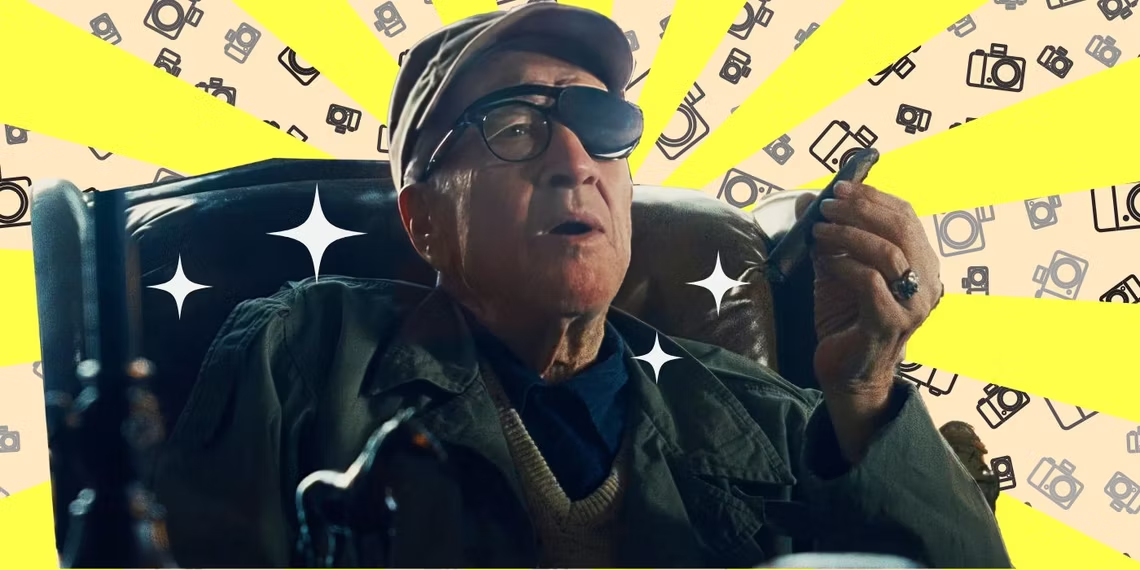It doesn't take long to recognize The Fabelmans as an autobiographical film about director Steven Spielberg's upbringing. Although the young protagonist's name is Sammy Fabelman (Gabriel LaBelle), his love for cinema and certain events reveal him as a clear stand-in for the filmmaker. As it is with all movies based on real events, though, it can sometimes be difficult to tell which parts of The Fabelmans are true, and which are embellished for the sake of narrative. Usually, polished dialogue and details are giveaways, as they can elevate a mundane instance to something filled with emotion, humor, or consequence. Oddly, though, in The Fabelmans, one of the most seemingly scripted scenes in the entire movie is actually taken nearly word-for-word from reality. It is the final scene in the film, and it serves as a cherry on top of this cinematic celebration.
What Happens in David Lynch's 'The Fabelmans' Scene?
In the scene, Sammy interviews for his first job in Hollywood, to serve as a production assistant on CBS's Hogan's Heroes. While interviewing, he speaks of his love for films, and the television executive encourages him to go across the hall, where one of the greatest film directors of all time works. Waiting for the mysterious man to return to his office, Sammy looks around the reception area and notices posters for Stagecoach, How Green Was My Valley, The Informer, The Searchers, and The Man Who Shot Liberty Valance. It then becomes obvious that he is waiting to meet with legendary director John Ford.
RELATED:
'The Fabelmans' Co-Writer Tony Kushner On Working With Steven Spielberg & Deciding On That Ending
When Ford arrives, he is played by none other than contemporary filmmaking legend David Lynch. He hobbles into his office wearing weathered clothes, an eye-patch, and lipstick stains all over his face. After his secretary goes in to wipe off the lipstick, Sammy enters, where Ford takes a long time cutting and lighting a cigar before stoically saying, "They tell me you want to be a picture maker." As the starstruck Sammy stammers for an eloquent response, Ford follows up by asking what Sammy knows about art and has him to analyze a couple paintings on the wall. Sammy begins reciting what he sees, just for Ford to yell at him and ask him to identify the images' horizons—at the top and bottom of the first and second painting, respectively. Ultimately, he leaves Sammy with the advice that once he can learn how (and why) to put the horizon at the top or bottom of a frame, and not through the middle, then he might someday make a half-decent film. With that, he tells Sammy to "Get the fuck out of my office" and as Sammy walks off down the studio lot, the camera joltingly pans upwards, placing the horizon at the bottom for a fraction of a second before the credits.
Did Steven Spielberg Actual Meet John Ford?
Humorful, meaningful, and narratively appropriate for the movie's finale, this scene can easily seem like a thick Hollywood embellishment in Spielberg's story. However, anyone who has watched interviews with Spielberg talking about his influences knows that he actually did meet John Ford during one of his first Hollywood interviews, and the encounter went almost exactly as depicted in The Fabelmans. He tells the story in the 2006 edition of Peter Bogdanovich documentary, Directed by John Ford, where Spielberg alongside other filmmakers talk about the impact that John Ford had on their careers. Early in the doc, Spielberg shares the story almost verbatim to The Fabelmans' final scene, right down to the lipstick stains and the explicit farewell.
On top of its endearingly stranger-than-fiction source material, the scene also works as a poetic denouement for the story. During The Fabelman's first act, Sammy goes to see The Man Who Shot Liberty Valance in the theater, and it serves as inspiration for some of his earliest, eight millimeter film projects. Ford's work sets Sammy on his own ambitious filmmaking journey, thus driving the movie's entire plot. Hence, this encounter with Ford in the third act signals a sort of achievement for Sammy. It also confirms that at the end of the story, Sammy will continue pursuing film. Despite his fluctuating relationship with the craft throughout the movie, Sammy leaves with the same inspired energy that he felt at the beginning—both times thanks to Ford.
In a broader sense, the scene also illustrates an important turning point in film history. John Ford was a master of Hollywood's Golden Age. He started his career in the silent era and worked up through the late sixties. His movies— particularly his contributions to the Western genre— reflected and reaffirmed an American mythos of heroism and justice in the first half of the twentieth century. One could argue that Spielberg's work has done the same in the century's second half. With Jaws, ET, Jurassic Park, and the Indiana Jones trilogy, Spielberg also endorses a mythological simplicity and optimism in his work. Like Ford, who directed over a hundred pictures across six decades, Spielberg is currently in his fifth decade of making feature films. Spielberg's impact on American cinema is immeasurable. He heralded in the blockbuster era, paving the way for the future of film while also paying homage to the past. Although tongue-and-cheek, this encounter at the end of The Fabelmans represents a passing of the torch from Old Hollywood to the New.
Lastly, the scene also has immense charm, mostly thanks to Lynch's hilarious performance. Whenever David Lynch gets in front of the camera, he seems to become a comically deadpan character-actor version of his eccentric self. Given that Ford was also an eccentric personality in Hollywood, it fits. At the same time, though, it also carries a funny irony, for while Ford and Lynch are both phenomenal directors, their work could not be more different. Ford's films are known for their straightforwardness, relying on archetypes and conventions to send a clear message. Lynch, on the other hand, challenges all notions of convention through surrealism and experimentalism. The fact that he plays such a notorious structuralist as Ford is thus a humorous wink for the cinephiles in the audience.
Although The Fabelmans feels like a tale that could go on forever—and there are certainly more stories in Spielberg's biography beyond his first interview in the entertainment industry— the film ends at what is arguably its highest moment. The movie as a whole is many things: an autobiography, a bildungsroman, a story of acceptance, and a family drama. However, it also serves as a love letter to cinema, and this final scene, recreating the quirky collision between two of Hollywood's most illustrious auteurs, encapsulates that love in a way that leaves the audience laughing, cheering, thinking, and feeling— just as all movies intend.




